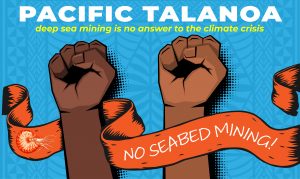COP26: Challenging extractive greenwashing
A summary of events at the People's Summit for Climate Justice (7-10 November) that focus on why we cannot mine our way out of the climate crisis.
Image: Boldist
Here we share a summary of mining and climate-related events at the upcoming People’s Summit on Climate Justice, which runs parallel to COP26.
These events, organised by YLNM members and our allies, will:
- Expose how the mining industry is attempting to capitalise on the climate crisis and why it must not be allowed to do so
- Explain why we can’t mine our way out of the climate crisis
- Amplify community voices from the frontlines of extraction who are building and sustaining post-extractive alternatives from below
Find out more and register here:
Extractivist growth and alternatives from below: Why we can't mine our way out of the climate crisis.
Frontline Response to Australia’s Green Extractivism
11.45am UTC/GMT. Monday 8th November
Australia is one of the main mining countries in the world, holding 40% of the total market share and is rapidly gearing up to take advantage of the mineral profits to be made from the race to net zero, with industry, economic and political support from the Federal Government. Voices from concerned frontline communities in the global south suggest that the race to net zero and the accompanied ‘green washing’ by companies is exacerbating existing and generating new extractive sacrifice zones – where human rights violations and ecological destruction are rapidly gaining a ‘green’ license to proceed with limited impunity.
This session will present preliminary findings of research conducted by Aid/Watch and Melbourne Rainforest Action Group that examines the footprint of Australian companies and their role in exacerbating human rights violations and ecological destruction in the name of climate action. We will present testimonies from the voices impacted by this approach to the climate crisis as well as engage in a dialogue around Regenerative Justice and the alternatives, followed by a Q&A discussion panel.
Speakers:
-
Claire Burgess, PhD student with University of Tasmania on environmental conflicts & Aid/Watch committee member.
-
Liz Downes, Researcher & Campaigner at Melbourne Rainforest Action Group (MRAG).
-
Kado Muir, Chair of the First Nations Heritage Protection Alliance (Juukan Gorge, Land Rights and Cultural Heritage in Australia)
-
Ivonne Ramos, Acción Ecológica Ecuador (Australia’s land grab for copper in Ecuador)
-
May Kotsakis, Philippines Australia Solidarity Association (Solidarity with groups against human rights abuses in the Philippines)
-
Lee Tan, Aid/Watch Malaysia (Rare Earths and radioactive waste in Malaysia).
Facilitated by Neylan Aykut from Melbourne Rainforest Action Group.
A Pacific Talanoa: deep sea mining is no answer to the climate crisis
Tuesday 9th November / Wednesday 10 November (via zoom)
Rarotonga, Cook Islands 9 am Tuesday 9th November | Glasgow, UK 8 pm Tuesday 9th November | Port Moresby, Papua New Guinea 5 am Wednesday 10th November | Melbourne, Australia 6 am Wednesday 10th November | Suva, Fiji 7 am Wednesday | Nukuʻalofa, Tonga 8 am

Over 1.5 million square kilometres of the Pacific Ocean is under deep sea mining exploration leasehold. Promoted by the deep sea miner as an answer to the ‘green’ transition and climate action, it is poised to be the largest mining operation in history.
But what is deep sea mining? Has it started yet? Can mining our deep seas be an answer to climate action? What will be the impacts on ecosystems and humans? Join this session with frontline Pacific voices in a talanoa (conversation) who are standing up, resisting, and mobilising against deep sea mining.
Speakers:
Dr Claire Slatter, Pacific Blue Line Collective, Fiji
Jonathan Mesulam, Coordinator, Alliance of Solwara Warriors, Papua New Guinea
Alanna Smith, Te Ipukarea Society, Cook Islands
Pelenatita Kara, National Coordinator, Deep Sea Mining Campaign, Civil Society Forum of Tonga
Moderator: Nat Lowrey, Deep Sea Mining Campaign
The session will run as a Digital Event. Register here
We can’t mine our way out of the climate crisis: achieving a just energy future for all
2pm UTC/GMT. Monday 8th November.
Frontline communities, mineworkers and environmental justice activists will explore the connections between their struggles for an inclusive just transition, to achieve a democratic and just renewable energy future for all. The session will focus on actions, pathways and policies to highlight the need to join in solidarity across global renewable energy supply chains at COP26 and beyond.
Contributors: Moderating: Anca Giugiu, London Mining Network / (Ugo Lapointe), MiningWatch Canada 1. Pius Ginting – AEER (possibly Siti Maimuna) 2. Ramon Balcazar – OPSAL 3. Emmanuel Umpula – Afrewatch 4. Samantha Hargreaves – WOMIN (possibly Trusha Reddy) 5. Diana Junquera Curiel – IndustriALL 6. Andy Whitmore – London Mining Network/ War on Want.
50 questions about mega mining: a pedagogical tool
4.15pm UTC/GMT. Monday 8th November.
We will share the process and the result of our pedagogical material that seeks to disseminate information about mega mining in Haiti and in communities in Latin America.
Contributors: Claudia Alavez Castin Milostene
Finite: The Climate of Change (Film Screening)
Indigenous leaders in the state of La Guajira, Colombia have used direct action tactics to take action against extractivist industries that threaten their way of life, including Latin America’s biggest coal mine, Cerrejón
